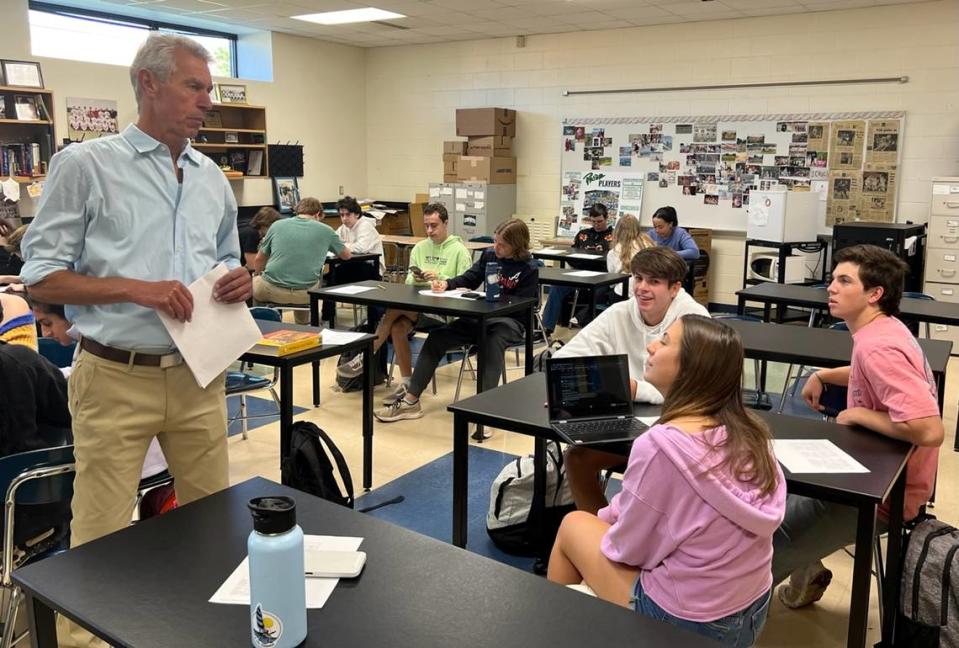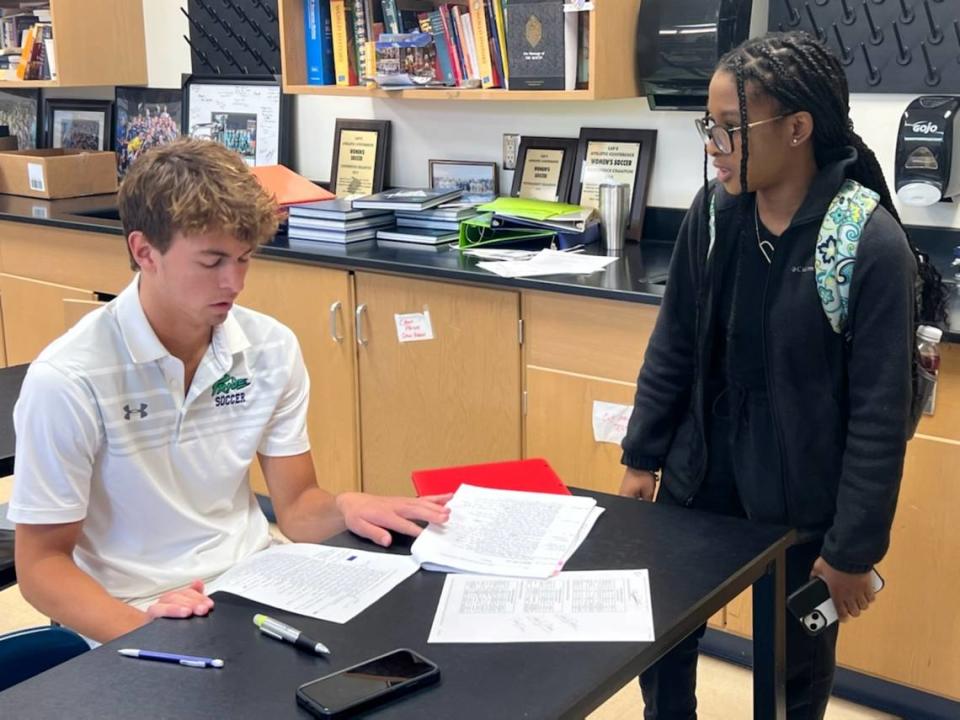Retiring Raleigh NC teacher counts popular class on religion among his lasting legacies
Paul Dinkenor last coached a Leesville Road girls soccer state championship team 12 years ago. Before then, he earned distinction among a small group of peers.
Dinkenor achieved a rare milestone as a coach, leading Leesville Road’s boys and girls soccer teams to two or more state championships each, earning titles in Class 4A boys in 1997 and 1999, and in 4A girls in 2008, 2009 and 2011.
This year, he’ll reach another major milestone in his teaching and coaching career: The Social Studies educator will retire at the end of the 2022-23 academic year.
Dinkenor, who has taught at Leesville Road since the school’s 1993 opening, is the architect of the school’s “World Religions and the Bible in History” course, which he has taught annually since the school’s second operating year. The Manchester, England, native holds undergraduate and graduate degrees from Cambridge University, where he captained the soccer team. He speaks in his native accent to articulate foundational perspectives for students of world faith traditions — and the world’s “football” (soccer).
“I’m hoping that I’m working as hard on the last day of my teaching career as I did back in September 1980 in Godalming, Surrey, England,” Dinkenor said. “Strangely enough, the one class with which I was completely uncomfortable, thanks to Mr. (Richard) Murphy, might be a little bit of a legacy.
“If you stay in a place long enough, then everything comes full circle.”

Carrying out a vision
Murphy, Leesville Road’s founding principal, commissioned Dinkenor — who admittedly had a secular upbringing — to develop the school’s “World Religions and the Bible in History” course.
Murphy, who served previously as Sanderson’s principal, reached out to Sanderson educator David Riggs and Enloe educator Vinetta Bell to partner with Dinkenor in developing the course.
Before Dinkenor came to Leesville Road, he taught and coached at North Forsyth.
Dinkenor extends Murphy’s vision daily, albeit under the late principal’s unique watch. Dinkenor’s classroom is in the school’s Richard Murphy Building.
Current Leesville Road principal Ian Solomon is adamant about Dinkenor’s concentrated efforts to rejuvenate his class’ educational field trips after the pandemic halted such off-campus teaching and learning for the past few years.
“In short, the integration of field trips is mandatory if one wants to provide students with authentic experiences,” Solomon said.
This term, Dinkenor and his students have visited the Roman Catholic Diocese of Raleigh’s Holy Name Of Jesus Cathedral, the Hindu Society of North Carolina, the Islamic Association of Raleigh, Temple Beth Or (Judaism), and the Kadampa Center for Tibetan Buddhism. Dinkenor and his students hope to make one more field trip and will welcome guest speakers to campus after the school’s spring break.
Dinkenor’s authenticity lays a firm foundation for studying religions within public education that heightens comfort levels for administrators and students.
“I think Mr. Dinkenor’s ability to look at religions from an analytical, ‘just-passing-by’ approach serves him well,” Solomon said. “His even-keeled demeanor is advantageous in delivering the curriculum.”
Leesville Road senior Dayna Wilkerson praised Dinkenor for his strong “self-awareness.”
“The fact he acknowledges he may not know something as well as others helps,” Wilkerson said. “He knows what he doesn’t know, and he gets us to find people who know.”
Luke Lovic, a senior who took Dinkenor’s course during remote teaching and learning, described the in-person experience as “a completely different class.”
“Self-admittedly, I wasn’t quite as engaged as I am this time around,” Lovic said. “He doesn’t attach himself to a religion personally, so there’s no bias at all when he’s delivering information.”

A commitment for tolerance
Dinkenor’s classroom dynamic is imbued by commitments to compassion and tolerance when discussing religions’ philosophies, which Dinkenor imparts at each term’s outset. Students, sometime more than 30 at once, thrive when collaborating in small groups and one-on-one concerning their diverse faith traditions (or lack thereof), and others’ responses to new learning.
Dinkenor attributes this dynamic to two realities from which he has benefited from having his athletes among his classes.
“We can sort of laugh with each other, joke with each other, and also learn. It conveys itself pretty early on to the rest of the class,” Dinkenor said. “I had students that played for me that knew a lot. They were helping me enormously when I first started.”
Dinkenor’s final teaching experience is enhanced by another “full circle” presence of one particular senior — his son, Camden Dinkenor. The youngest Dinkenor, like his sister Chelsea (Leesville Road ’20), has been taught and coached by his father.
Paul Dinkenor met and married wife, Heather, when both taught at Leesville Road. Heather, a long-time English educator, retired from the school in the spring of 2021.
“He’s my role model,” Camden Dinkenor said. “It’s nice seeing him do what he’s good at, and that’s coaching and teaching, and just being a good father. The more I can be around that, the better I’m going to end up.”
Coaching, teaching intertwined
Dinkenor’s teaching is impacted directly by his coaching, from which he stepped away after the girls spring 2022 season and the boys fall 2022 campaign. In the spring of 2019, Dinkenor reached out to previous Cardinal Gibbons boys soccer coach Tim Healy about the possibility of students visiting the Cathedral, which opened in 2017.
Healy used his connections to facilitate this request. On March 23, Dinkenor’s students returned to the Cathedral for the first time since 2019.
“Paul’s fascination with religion leads to open discussions that you didn’t think you were going to have that day,” Healy said.
Dinkenor requires students’ appropriate, effective use of religion-specific vocabulary in the classroom.
Dinkenor-led field trips connect religious traditions’ experts, parent chaperones, educators, and students in collaborative discourse, reaffirming the need for experiential, in-person learning.
Camden Dinkenor said he is often asked by students who didn’t get to take the trips in the pandemic if they can accompany the class this time around.
In Dinkenor’s traditional classroom and on the soccer field, “he definitely evokes something out of everybody,” Camden Dinkenor said. “He’s able to do that in both settings very easily.”
Lila Killian, a senior who played three girls soccer seasons under Dinkenor, described Dinkenor’s rhetorical impacts as “powerful” and “captivating” in both settings. More impressive, Killian said, is how Dinkenor supports his words with actions.
“Until you actually see it, you don’t really understand or grasp the passion, and the way it plays into these peoples’ lives,” Killian said.
She continued: “All these different field trips give you opportunities to have some confidence in your own faith. This class gives you the opportunity for exposure to all these different religions to know what you truly believe.”
Dinkenor said he is still deciding what comes after teaching and coaching as it coincides with Camden’s graduation. Like his students, he will continue learning by asking questions.
As for his students, Dinkenor said: “Being exposed to these different houses of worship and hearing from experts makes them realize there are many other faiths out there, many other paths up the same mountain. It’s helped build tolerance and compassion, and people ask questions.
“Today’s generation is very much about asking questions. Religion, I think, provides some of those answers.”

